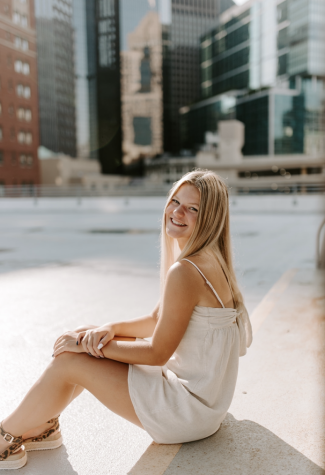Time is a Choice: How do you Choose?
May 19, 2021
Student, athlete, part-time worker, club officer, organization member, daughter, teammate, friend: a list of common titles that teenagers, like myself, balance in a short 24 hour day. Burnout, sleep-deprivation, and pure exhaustion piled over in front of us after the years of countless and repetitively structured days. Beyond that, anger, lack of hope, and utter disappointment manifested after March 13th, 2020.
In fact, according to a new survey by BestColleges, 78% of households with a high school or college student have experienced disruptions stemming from COVID-19. Being absent from a handful of sought after events due to Coronavirus and quarantine the past year, students are faced for the first time ever, free time. Most, if not all of us grew comfortable with the commonly said excuse, “I’m sorry, I don’t have time.” After just shy of 12 months without 5 days of school in person, nearly 6 months of no athletic activities and other school clubs/events; high school students took for granted the regularly scheduled program that felt merely normal. Now, over a year later, normalcy has finally full circled back, or at least began to approach us. With loads of school work, several games a week, work in the evenings and weekends, and everything in between, time management is a constant and continuous battle with students. How do you measure your time: wasted or optimized? Furthermore, how do students map and discover the true coordinates of time management?
How do you make decisions that let you see beyond your everyday inbox, busy work, and demands of others? I uncovered that there are huge mismatches between how you think you spend your time and how you actually spend it. I studied my own habits. I cracked down on my own habits and precisely collected personal data on how I am spending every minute. Simple findings: we can deal with the fear, and the reality, of disappointing other people and not meeting their expectations. Furthermore, there are actually copious strategies at our fingertips to accomplish the personal realization that, “Time is a choice, you’re ALWAYS choosing how you spend your time.”
Busy people, like myself, often face the curious question: “How much time do I actually have?” Specifically, Laura Vanderkam, the author of several time management and productivity books shares her regrets on wasting time and spills the secrets on one like herself, who can optimize their time without burnout and instant regret.
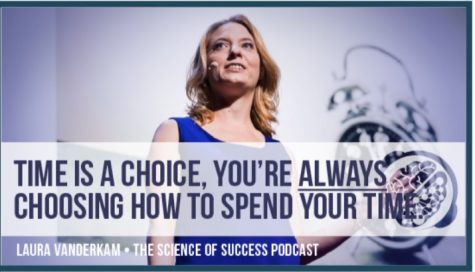
Ted Talk^ How to gain control of your free time
Her TED talk titled “How To Gain Control of Your Free Time” has over 5 million views and she is the co-host of the podcast Best of Both Worlds. Her work has appeared in publications including the New York Times, the Wall Street Journal, Fast Company, and Fortune.
In Laura’s 12 minute seminar discussion with other middle aged professionals and young adults she comically shares a personal story about her discovery of the key to succeeding time management. Figuratively and literally she explains that time is like a water heater.
Laura works upmost of 50 hours a week with several children and a husband to take care of. Like the rest of us, she often puts aside to-do list chores like dusting blinds and cleaning out closets. One hectic morning she discovered unexpectedly, there was no hot water during her shower. In a rush before work, she called a repair service. Laura had to wait 7 hours for a repairman to come fix her water heater. 7 hours. She cried to the audience in embarrassment. Laura then explained that if her friend asked her if she had 7 hours to go out for the day with her, she would immediately deny and send the excuse, “I’m sorry, I don’t have time.” Although, she had 7 hours of time to wait for hot water, because she wanted it. Laura realized she does have 7 hours for her friend, if she wants it. Time is like a water heater: saying yes to something (fixing the water heater) is, by definition, saying no to something else (work). Every choice to do one thing is, by definition, a choice to NOT do something else. Laura concluded, “You have to choose the way you spend your time, whether you like it or not.”
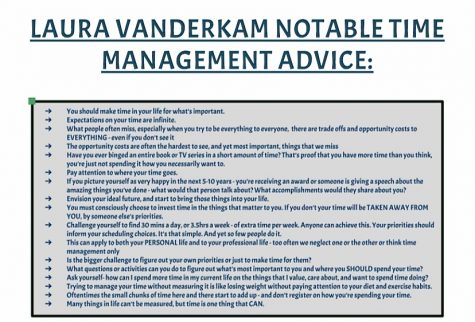
Eager to find my personal realization, also known as, my 7 hours of water heater repair, (because I geniunley did not believe Laura that I had an extra 7 hours in a day) I began to track my exact use of clock ticking. Beginning on Monday April 19th and ending Wednesday April 21st, I recorded how each hour was spent. (refer to image on the left) Keep in mind, that is 72 total hours of documented time:
- 19 hours and 30 minutes was recorded for sleeping (an additional 2 hours for after school naps).
- An average of 7 hours a day I was on my phone.
- 11 hours total went solely to social media and texting in my bed, alone.
- Leaving us roughly 40 hours of other activity.
- 3 of those hours went towards driving,
- another 12 hours were spent on Zoom for school,
- and 1 hour and 30 minutes went to additional school work.
- I was then down to a half hour shy of one full day left to jam in sports and social activities.
To be exact, I spent a total of 9 hours on the lacrosse field and at the stadium. Of course I can not forget to eat, that roughly took up 5 hours of my time. In just 3 days, 72 hours, I was left with 10 hours of free time. That is nearly half of a day left for me to “make a choice.” Now, I know where those 10 extra hours went to, but it’s quite embarrassing how I wasted that time. I digress.
The big picture of it all though, I could have spent those 10 hours wrapping up the handful of missing assignments in the depths of Google Classroom, the list of scholarship applications I have yet to submit, clean out the clothes in my closet that have not been touched in years, meet up with a friend I have not seen in months… the list goes on.
10 hours seems MORE than enough to finish a few essays right? Of course it is. It’s just not a priority. I’ve been blowing off going back to the gym, sending in job applications, cleaning my room, an endless to-do list it seems like. With only 600 minutes, in every 3 days. As Laura preached: “Time is a choice.” The next step is how teenagers, like myself, should optimize their dreamt of free time.
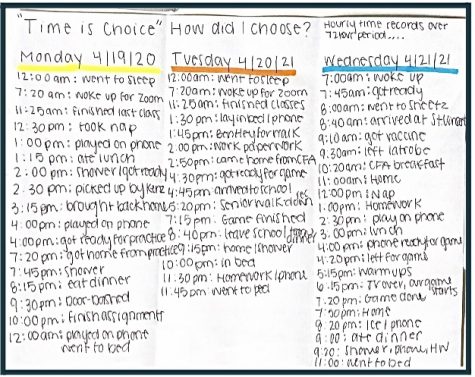
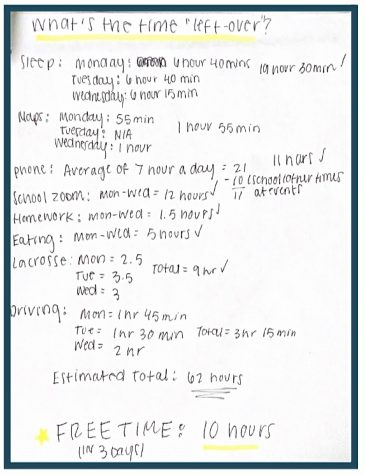
Above are records and data collected by Miah Wojdyla for a span of 3 days.
In a recent poll taken by Norwin High School students, 47 out of 62 students said they “strongly agree” their free time was optimized as best as possible during the spring and summer of 2020 due to Coronavirus. Of those same students, 36 of 62 submitted that their free time during the 2020-2021 school is believed to be “5-10 hours a week.” We can argue those 36 students have not had their own “water heater moment.” To put this in perspective for poll takers I asked 3 students after they submitted their response to precisely track 24 hours of their day and report back to me with their findings. 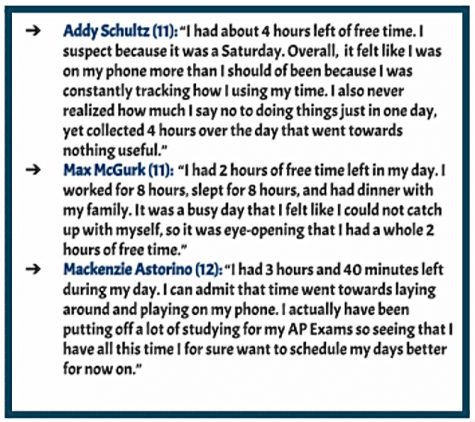
Nearly all high schoolers relate (especially those who lived and breathed COVID-19 impacts), we all tell freshmen to, “enjoy it while you have it, it goes fast!” We constantly tell ourselves and others time is the limit. No, rather we limit what our time goes to. If you don’t spend your free time like this, it doesn’t mean you have no chance of being successful. However, picking up some of these strategies can improve your abilities, improve your mindset, and expand your network to levels that will increase your chances for success in the workplace. Start incorporating a few of them into your free time routines and you might just be surprised at the results.
If someone came up to you and said read this 500 page book for me in 1 week for 10,000 dollars would you do it? I sure hope so it’s money. Teens are stuck managing time based on what we have to do to become satisfied. But is content enough? Will we regret it, just like how we tell freshmen? Make time for what you want, you need, and time will find itself.


